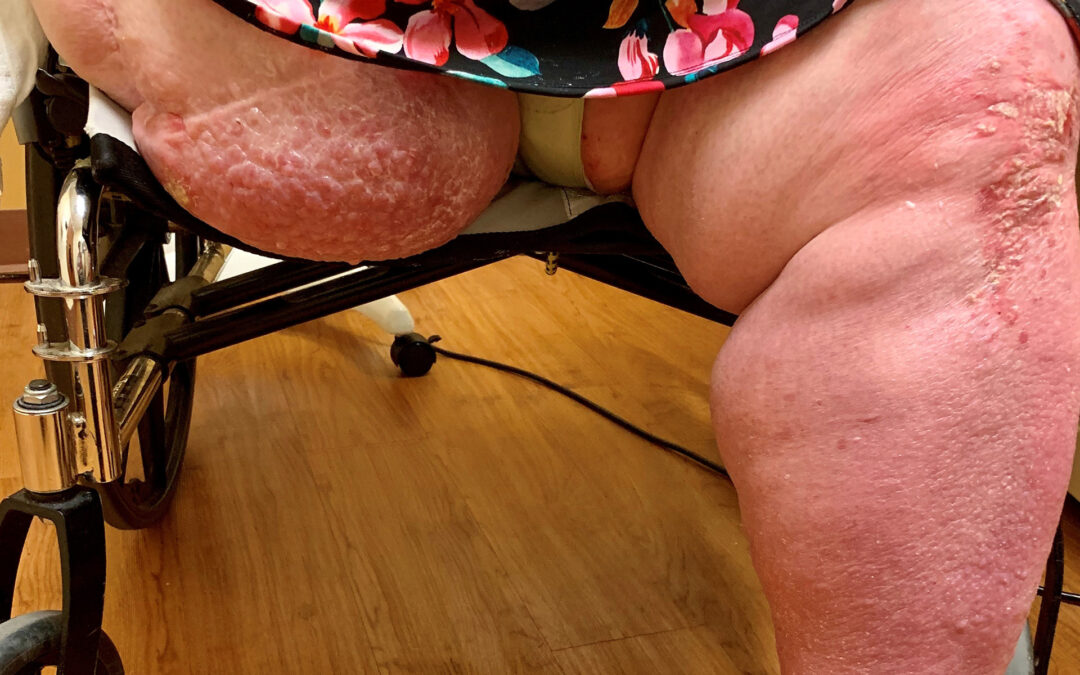I saw this patient almost 5 years ago, but her case is one of those that I can’t get out of my mind. I now understand what I was looking at, but I didn’t understand it at the time. The woman was in her late 60’s and an orthopedic surgeon sent her to me because she continued to complain of severe left knee pain 3 months after a total knee replacement. The surgeon said that the X-rays “looked good.” However, the pain was so severe she was not able to bear weight on the left leg.
I saw what is obvious in the photo – that she is morbidly obese and missing her right leg above the knee – so it’s not surprising that she would have serious problems using her left leg for transfers even under the best of circumstances. She’s also got terrible edema. In fact, she’s got lymphedema that is severe enough to cause “cobblestone” changes of the right above knee amputation stump.
There’s something else obvious in the photo. She has psoriasis. You can’t see the rest of her, but about a third of her body was covered with psoriatic plaques. As I spoke to her, it she had symptoms of heart failure (although she had not been diagnosed with it). The history of the right leg amputation was hazy but sounded like it was due to ischemia, perhaps not surprising since she had diabetes. In fact, I wondered how she’d ever been cleared by anesthesia for knee surgery. When I broached the fact that her pain might be due to inflammatory arthritis, that the cause of her long-standing edema might be important to understand, and that she needed to back to her cardiologist, she got angry and left. She had wanted me to fix her left knee pain and if I couldn’t do that, then she wasn’t coming back. I was slow in calling the orthopedic surgeon but when I finally did, he told me not to worry about it – she had died of a sudden myocardial infarction.
A recent article in JAMA, Skin Inflammation, Systemic Inflammation, and Cardiovascular Disease in Psoriasis, made me think of this woman so I decided to share the story. Here’s what I understand now, but didn’t know then. Psoriasis, a common chronic inflammatory condition, is associated with a higher risk of cardiovascular disease. The risk is related to the percent of the body affected. Psoriasis confers a “dose-dependent” increase in the risk of metabolic syndrome and its related complications such as coronary atherosclerosis. A review paper, published 3 years after I saw this woman, Psoriasis and Cardiometabolic Diseases: The Impact of Inflammation on Vascular Health, explains relationship between psoriasis and important cardiovascular risk factors such as obesity, dyslipidemia, insulin resistance and hypertension.
This lady’s medical problems are a great illustration of Occam’s razor – the simplest explanation is the best. She did not have 4 or 5 totally different diseases. She had one big problem – a severe chronic inflammatory state – that had caused all her other problems. Three years later I did a better job putting the pieces together when I saw a man with pyoderma gangrenosum, diabetes, inflammatory bowel disease, cystic acne, and hidradenitis supprativa. If you ever see a patient with multiple apparently different diseases, and you think to yourself, “How could anyone be this unlucky?” Ask whether all their problems might, in fact, be related.
Here are few excerpts from the 2021 review article about psoriasis and cardiovascular disease:
“While states such as hyperlipidemia, hypertension, and obesity themselves promote inflammation, they are also increased in states of chronic inflammation… psoriasis also leads to systemic, and especially vascular, inflammation. Psoriasis is associated with a higher risk of cardiometabolic diseases, including a higher risk of myocardial infarctions compared to the general population… In psoriasis, skin disease gives a view into vascular health… The psoriasis area and severity index score, a measure of psoriatic skin burden, associates with aortic vascular inflammation… severe psoriasis, also confers a higher risk of major adverse cardiovascular events.”
Now the thing that keep asking myself is, “How could she have seen so many doctors, and none of them put the pieces together?”

Dr. Fife is a world renowned wound care physician dedicated to improving patient outcomes through quality driven care. Please visit my blog at CarolineFifeMD.com and my Youtube channel at https://www.youtube.com/c/carolinefifemd/videos
The opinions, comments, and content expressed or implied in my statements are solely my own and do not necessarily reflect the position or views of Intellicure or any of the boards on which I serve.




So, in your opinion, considering that systemic inflammation was the common denominator, wouldn’t consistent, mild hyperbaric treatments been of benefit to her?
I’m hoping Dr. Fife responds to this. Very interested.
Will, I have been doing mild hyperbaric with a home chamber since 2011. It saved me and gave me my life back. I’m happy to share what I have learned with you!